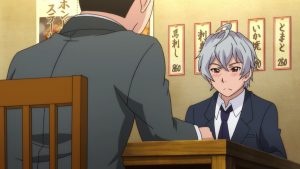 I can definitely say I’m ready for Gegege no Kitarou to return to more substantial ground. Fortunately the preview suggests that may happen next week (the story seems to surround a land dispute between humans and youkai). There’s nothing wrong with this more kid-friendly episodes but they don’t generally show off the series at its best. This one wasn’t among my favorites, but it did at least have a bit of interesting social observation going on.
I can definitely say I’m ready for Gegege no Kitarou to return to more substantial ground. Fortunately the preview suggests that may happen next week (the story seems to surround a land dispute between humans and youkai). There’s nothing wrong with this more kid-friendly episodes but they don’t generally show off the series at its best. This one wasn’t among my favorites, but it did at least have a bit of interesting social observation going on.
 If you remember Charatomi, he’s the annoying “Ootuber” that appeared way back in the premiere, and has become almost a semi-regular at this point. This time around he’s forced to confront the ugly reality of getting a real job, as apparently the Ootube channel isn’t quite making ends meet. To that end he hooks up with Nuke-kubi (Kawazu Yasuhiko, a veteran of the ’96 and ’07 series and the ’97 movie), a youkai who’s head radiates heat and and body cold, and also has a thirst for the spotlight. His quirky nature makes him an ideal subject for the jackass’ videos, and the rest is history.
If you remember Charatomi, he’s the annoying “Ootuber” that appeared way back in the premiere, and has become almost a semi-regular at this point. This time around he’s forced to confront the ugly reality of getting a real job, as apparently the Ootube channel isn’t quite making ends meet. To that end he hooks up with Nuke-kubi (Kawazu Yasuhiko, a veteran of the ’96 and ’07 series and the ’97 movie), a youkai who’s head radiates heat and and body cold, and also has a thirst for the spotlight. His quirky nature makes him an ideal subject for the jackass’ videos, and the rest is history.
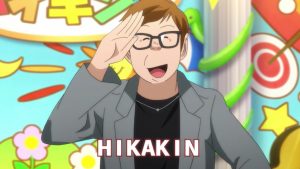 Sometimes with this version of Gegege no Kitarou it can be very difficult to figure out just what the core beliefs of the story are. For much of the first year it seemed to be espousing a robustly internationalist and pro-tolerance philosophy, then during the Western Youkai arc it devolved into some frankly ugly neo-nationalist and anti-immigrant dog whistles (a trough from which it has since recovered, I might add). Now we have an incredibly annoying (by design) character who’s the clear villain of much of this subplot, but whose perspective on individuality is one which the series seems to have a lot of sympathy for.
Sometimes with this version of Gegege no Kitarou it can be very difficult to figure out just what the core beliefs of the story are. For much of the first year it seemed to be espousing a robustly internationalist and pro-tolerance philosophy, then during the Western Youkai arc it devolved into some frankly ugly neo-nationalist and anti-immigrant dog whistles (a trough from which it has since recovered, I might add). Now we have an incredibly annoying (by design) character who’s the clear villain of much of this subplot, but whose perspective on individuality is one which the series seems to have a lot of sympathy for.
 Or so I thought until the ending of the episode, which had me scratching my head. As grating as he is Charatomi is right in his notion that a life as an overworked and underloved salaryman is hardly something to aspire to, and there’s something elementally admirable in his desire to be the main character in his own story. But after a chance meeting with more successful Ootuber Hikakin – who’s apparently a real person and plays himself – Charatomi seems to see the error of his ways (wait – what?). Fortunately Mana (!) figures out where he’s hidden Nuke-kubi’s body as part of an ill-advised publicity stunt, allowing Kitarou and Neko-musume to prevent Charatomi from going down as a terrorist.
Or so I thought until the ending of the episode, which had me scratching my head. As grating as he is Charatomi is right in his notion that a life as an overworked and underloved salaryman is hardly something to aspire to, and there’s something elementally admirable in his desire to be the main character in his own story. But after a chance meeting with more successful Ootuber Hikakin – who’s apparently a real person and plays himself – Charatomi seems to see the error of his ways (wait – what?). Fortunately Mana (!) figures out where he’s hidden Nuke-kubi’s body as part of an ill-advised publicity stunt, allowing Kitarou and Neko-musume to prevent Charatomi from going down as a terrorist.
 So what exactly is Gegege no Kitarou trying to tell us here, after having Charatomi’s aspirations more or less validated by wizened old heads Hikakin and Medama-oyaji only to have him wind up seemingly happy working as a drudge at an izekaya? Frankly I really have no idea, and if that’s his story he needs to hire some new writers. I hope we’re not supposed to believe that he’s thrown over his desire not to be a faceless cog in society’s gears, or that he’s truly happy working in that job – maybe the idea is that you need to bide your time and serve others while you try and figure out what bliss to follow. Or something. In any event, this dilemma is a rather interesting and somewhat subversive theme in Japanese – this series is very good at subversive – but in the end, the whole storyline doesn’t really work for me. Next week, hopefully, things pick up.
So what exactly is Gegege no Kitarou trying to tell us here, after having Charatomi’s aspirations more or less validated by wizened old heads Hikakin and Medama-oyaji only to have him wind up seemingly happy working as a drudge at an izekaya? Frankly I really have no idea, and if that’s his story he needs to hire some new writers. I hope we’re not supposed to believe that he’s thrown over his desire not to be a faceless cog in society’s gears, or that he’s truly happy working in that job – maybe the idea is that you need to bide your time and serve others while you try and figure out what bliss to follow. Or something. In any event, this dilemma is a rather interesting and somewhat subversive theme in Japanese – this series is very good at subversive – but in the end, the whole storyline doesn’t really work for me. Next week, hopefully, things pick up.


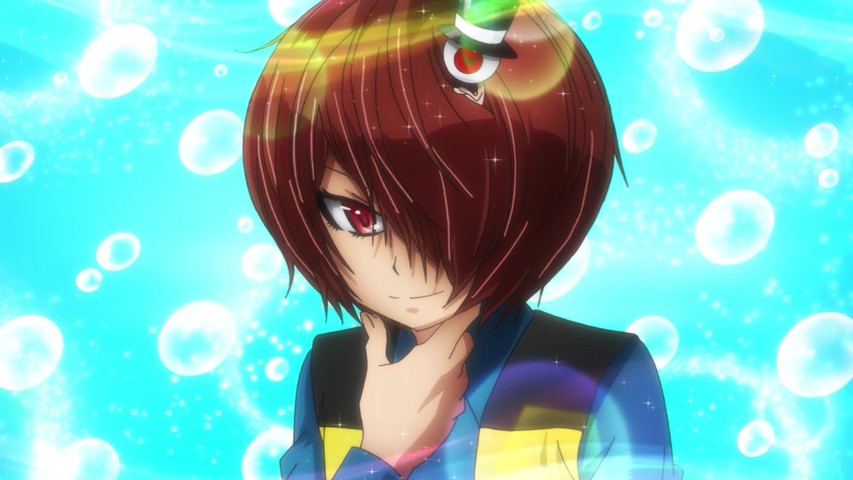

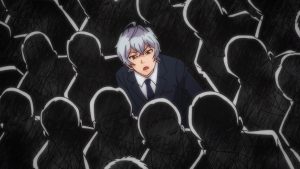










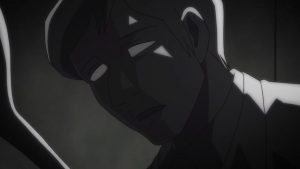







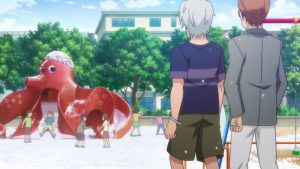


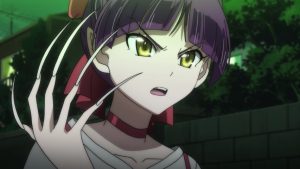
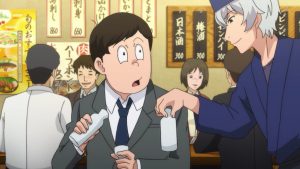



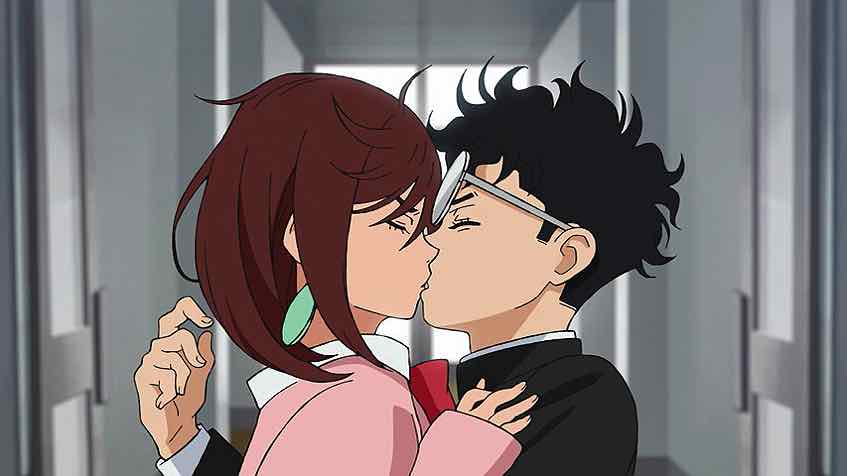
Robert Black
April 30, 2019 at 12:24 pmThis episode asked the right question – How does one cope when facing the soul-crushing corporate zombie world? But alas, I don’t think it came up with the right answer. I’d be willing to bet that Charatomi’s blissful contentment as a waiter and busboy will fade long before Kitaro captures the Four Treasonous Generals.
I have question, though, about Japanese culture. Here in the US, my answer has been to think of my day job as the financial support I need to continue writing. But we hear all these stories about the long, intense hours of a Japanese salaryman. My company, in fact, has Japanese owners, so I hear from colleagues who have made visits over there. Would a Japanese salaryman even have the time and energy for something creative in his off-hours? What about someone more working class, in a job like Charatomi’s?
Guardian Enzo
April 30, 2019 at 1:22 pmThe issue with a blue collar job is that within reason, if you work OT you get paid for it. Salarymen work as many hours as their company demands.
In the real world, most salary workers probably wouldn’t have much time for creative pursuits. Or energy, for that matter. There is a trend away from black companies and 80 hour work weeks, but change comes very, very slowly here.